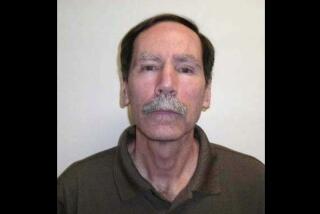‘Pillowcase Rapist’ Beating Mystifies Indiana Police
- Share via
GARY, Ind. — Twelve days ago, Reginald Muldrew, the infamous “pillowcase rapist,” was found beaten nearly to death on a gritty eastside street in Gary, Ind.
How he ended up that way, however, is a matter of dispute.
Did the man who allegedly raped 200 women in the Los Angeles area finally meet retribution at the hands of vigilantes? And was he responsible for a series of alleged sexual assaults at a Gary housing project, sparking the anger of a mob that hunted him down? Or was he the victim of random urban violence?
Police said Friday that they are trying to determine what prompted the beating of Muldrew, who moved to Gary to be near his brother. So far, no one has come forward to tell police why the man was pummeled so badly that he’s been in critical condition at a local hospital ever since. At one point, doctors induced a coma because Muldrew was thrashing about and could not be treated.
Some people are calling it street justice for a man who was convicted of four rapes and various other crimes. He was sentenced to 25 years in California state prison, but served 16 years, earning time off for good behavior.
“All I know is that he’s in the hospital half dead with a [tracheotomy] tube in his throat,” said Sandy Cogan, a spokeswoman for the mayor’s office in Gary. “And that he got there . . . from vigilantes at 17th and Central Drive.”
Muldrew was released from prison in December, a move that sparked heated criticism from women’s groups who warned that he would rape again. The last the world saw him, he was in Las Vegas telling reporters that it was “up in the air” whether the feminists’ predictions would come true.
While Gary police said they had no evidence to indicate that Muldrew had committed any sexual assaults in their community, the rumors were rampant Friday at the Dorie Miller Housing Development, which is in the eastside neighborhood where Muldrew was found.
Emma Johnson, the president of a tenant association at the 268-unit, low-income development, said five sexual assaults have occurred in the area and some residents speculate that Muldrew may have been responsible. In one of those attacks, Johnson said, residents heard a woman screaming in the early morning and went to investigate.
The woman whose home was broken into said a man whom she was unable to identify entered her house, put a pillow over her face and threatened to kill her before fleeing with a purse.
He was chased by a group of people, residents said.
“He tried to run and they caught him,” Johnson said. “They held him and then they beat him. . . . I’ll tell you one thing, since that man ended up in the hospital, there ain’t no rapes. People will think twice before they come in here and do that again.”
Johnson said residents did not know that Muldrew was a convicted serial rapist until they saw news reports on his beating.
“We hadn’t had no notice about him in our area,” Johnson said.
Police are investigating the incident as a home invasion robbery rather than an attempted sexual assault. Although no one has identified him in connection with the break-in, authorities said he told police that the people he had just robbed beat him.
Police Chief Thomas Papadakis said authorities are investigating whether he committed other burglaries.
“Our investigator has three or four cases of home invasions that have some similar [modus operandi] to California cases,” Papadakis said. “But there’s nothing definite there at this point.”
Muldrew is still unable to speak because of the tracheotomy tube, police said. Until they talk to him--or until witnesses to the beating come forward, they’ll be unable to corroborate the rumors, Gary Police Det. Joe Griffin said.
“Look, this is all street talk,” Griffin said. “There’s nothing out there that gives us any reason to believe any of it is true. Until then, it’s just talk.
“I know nothing about any earlier rapes [at the housing project],” he said.
Muldrew had been paroled to Covina more than a year ago, but 3,000 community residents protested. Their complaints prompted Gov. Pete Wilson to sign a sexual predator law that keeps sexual offenders in psychological custody for at least two years after their prison term until they can pass a psychological exam.
Muldrew was dubbed “the pillowcase rapist” in the late 1970s because he covered his victim’s heads with pillowcases, blouses or scarves. When he was released in December, with nine years off for good behavior, the only condition of his release was that he register as a sex offender if he should return to California.
Prison officials said he is still mentally unstable and a danger to himself and others. They said, however, that they had no legal choice but to release him.
Susan Carpenter McMillan, president of the Pasadena-based Women’s Coalition, said she plans to take a few of Muldrew’s California victims to Gary to “meet with the governor and thank [the residents].”
Barbara Russaw, 52, who lost her job and became temporarily homeless shortly after her rape in 1978, is one of the victims who will accompany McMillan.
At a news conference preceding Muldrew’s release from prison, Russaw wore all black. On Friday, she wore a bright fuchsia dress to a midmorning news conference outside the Los Angeles County Criminal Courts Building.
She said she “was dancing all night” when she heard about Muldrew.
“I still had nights where [I felt as though] he was in my house,” she said. “I don’t want him dead. I want him to live to look in [our] faces and let him know what he’s done to me and to other women.”
Next to her, a Los Angeles woman who asked to be referred to as Beverly, nodded.
“You reap what you sow,” said Beverly, who has a scar from the left side of her mouth to her cheekbone where Muldrew slashed her in 1975. “I hope as he lies in [a coma], every face of everyone he’s ever done flashes through his mind.”
Daunt reported from Los Angeles and Braun reported from Gary. Times correspondent Mayrav Saar and Associated Press contributed to this story.
More to Read
Sign up for Essential California
The most important California stories and recommendations in your inbox every morning.
You may occasionally receive promotional content from the Los Angeles Times.










